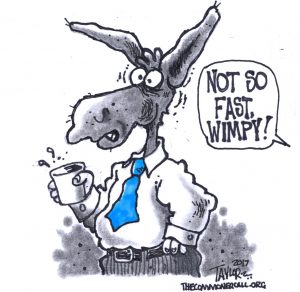
By Heather Gautney
The Guardian (6/11/18)
Ask countless Bernie Sanders supporters, and they’ll tell you a big reason he lost the Democratic party primaries is simple: the process was rigged. In one state after another, the votes by party elites – so-called “superdelegates” – counted more than those of regular members. And arduous voting requirements meant that countless people who would have voted for Sanders were denied that right. If the Democrats want any hope of voting Trump out of the White House, it is urgent they fix this broken system before the next election.
As a member of Sanders’ campaign, I’ll never forget watching the primary votes being counted for Michigan, one of the key states that decided the 2016 election. Sanders’ “pledged delegate count” – which reflected the number of votes he received from rank-and-file Democrats – exceeded Clinton’s by four. But after the superdelegates cast their ballots, the roll call registered “Clinton 76, Sanders 67”.
Superdelegates are drawn from entrenched party leadership, and in 2016, at least 63 of the 712 total were registered lobbyists, and 32 more “shadow lobbyists”, some of which were associated with big banks, payday lenders and large corporations.
This repeated itself in other states. In Indiana, Sanders won the vote 44 to 39, but, after the super delegates had their say, Clinton was granted 46 delegates, versus Sanders’ 44. In New Hampshire, where Sanders won the vote by a gaping margin (60% to 38%) and set a record for the largest number of votes ever, the screen read “16 Sanders, 16 Clinton”.
Sanders “lost” those states because hundreds of superdelegates had pledged their votes long before the primaries and caucuses began. By including those prearranged votes, running media tallies reinforced the inevitability of a Clinton win and the common perception that the Democratic primary was “rigged”. In June, the Associated Press went so far as to call the primary in Clinton’s favor – before Californians even had a chance to cast their votes.
During the New York primary, between 3 and 4 million “unaffiliated” voters were disenfranchised due to a statute that required changing one’s party affiliation 25 days prior to the previous general election. In 2016, that deadline was 193 days before election day. Over a third of under-30 voters – Sanders’s core constituency – weren’t registered to any political party. When those young people tried to vote, they were turned away. …

